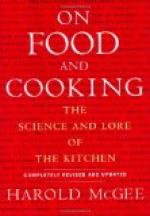LENTIL GRAVY WITH RICE.—Rub a cupful of cooked lentils through a colander to remove the skins, add one cup of rich milk, part cream if it can be afforded, and salt if desired. Heat to boiling, and thicken with a teaspoonful of flour rubbed smooth in a little cold milk. Serve hot on nicely steamed or boiled rice, or with well cooked macaroni.
TABLE TOPICS.
The men who kept alive the
flame of learning and piety in the Middle
Ages were mainly vegetarians.—Sir
William Axon.
According to Xenophon, Cyrus, king of Persia, was brought up on a diet of water, bread, and cresses, till his fifteenth year, when honey and raisins were added; and the family names of Fabii and Lentuli were derived from their customary diet.
Thomson, in his poem, “The
Seasons,” written one hundred and sixty
years ago, pays the following
tribute to a diet composed of seeds
and vegetable
products:—#/
“With such a liberal
hand has Nature flung
These seeds abroad, blown
them about in winds— ...
But who their virtues can
declare? who pierce,
With vision pure, into those
secret stores
Of health and life and joy—the
food of man,
While yet he lived in innocence
and told
A length of golden years,
unfleshed in blood?
A stranger to the savage arts
of life—
Death, rapine, carnage, surfeit,
and disease—
The lord, and not the
tyrant of the world.”
Most assuredly I do believe that body and mind are much influenced by the kind of food habitually depended upon. I can never stray among the village people of our windy capes without now and then coming upon a human being who looks as if he had been split, salted, and dried, like the salt fish which has built up his arid organism. If the body is modified by the food which nourishes it, the mind and character very certainly will be modified by it also. We know enough of their close connection with each other to be sure of what without any statistical observation to prove it.—Oliver Wendell Holmes.
The thoughts and feelings which the food we partake of provokes, are not remarked in common life, but they, nevertheless, have their significance. A man who daily sees cows and calves slaughtered, or who kills them himself, hogs “stuck,” hens “plucked,” etc., cannot possibly retain any true feeling for the sufferings of his own species....Doubtless, the majority of flesh-eaters do not reflect upon the manner in which this food comes to them, but this thoughtlessness, far from being a virtue, is the parent of many vices....How very different are the thoughts and sentiments produced by the non-flesh diet!—Gustav Von Struve.
That the popular idea that beef is necessary for strength is not a correct one, is well illustrated




